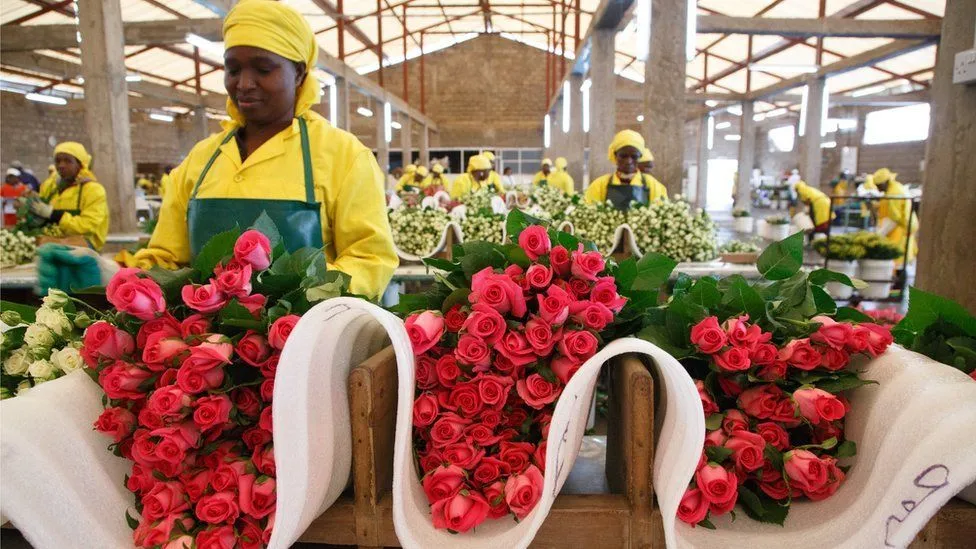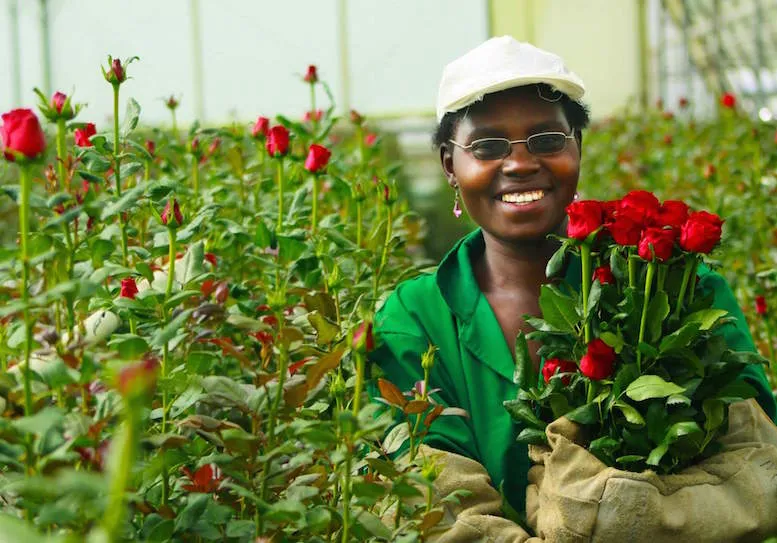In the lush fields of Kenya, rose farms are harnessing the power of artificial intelligence (AI) in the battle against climate change. With the global warming crisis looming, these innovative farms have turned to cutting-edge technology to mitigate the impact of adverse weather patterns on their delicate blooms. By analyzing real-time weather data and utilizing sophisticated algorithms, AI systems can make precise predictions and adapt irrigation and greenhouse conditions accordingly. This not only helps maintain the quality of the roses but also conserves water, decreases energy consumption, and reduces the carbon footprint of the farms.
With AI, rose farms in Kenya are revolutionizing the way they operate, ensuring a sustainable future for the industry while maintaining their reputation for producing some of the world’s finest roses. Embracing technology and environmental stewardship, these farms are taking proactive steps to adapt to the challenges posed by climate change, safeguarding both their livelihoods and the beauty of their blossoms for generations to come.
The impact of climate change on rose farms
Climate change has had a significant impact on rose farms in Kenya, posing numerous challenges to the delicate ecosystem required for growing these beautiful flowers. Rising temperatures, irregular rainfall patterns, and an increase in extreme weather events have all contributed to an unpredictable environment for rose cultivation. The traditional methods of relying on experience and intuition are no longer sufficient to ensure the health and longevity of the plants. To combat these challenges, rose farms have turned to AI as a game-changing solution.
AI systems are capable of analyzing vast amounts of data, including historical weather patterns, current conditions, and even local microclimates. By examining this data, AI algorithms can make accurate predictions about future weather patterns, allowing rose farms to proactively adjust their cultivation practices. This not only helps protect the plants from adverse conditions but also optimizes resource usage, making the entire operation more efficient and sustainable.

The role of AI in mitigating climate change effects
AI plays a crucial role in mitigating the effects of climate change on rose farms by providing valuable insights and recommendations based on real-time data analysis. Through sophisticated algorithms, AI systems can identify the optimal conditions for rose growth, taking into account factors such as temperature, humidity, and sunlight. By constantly monitoring and adjusting these conditions, AI ensures that the roses receive the precise care they need to thrive.
Furthermore, AI can assist in the management of water resources, a critical concern for rose farms in water-scarce regions. By analyzing weather data and soil moisture levels, AI systems can determine the exact amount of water required for irrigation, minimizing waste and conserving this precious resource. This not only benefits the environment but also reduces costs for the farmers, making their operations more economically viable.
How AI is used in rose farms for climate change adaptation
AI is used in various ways in rose farms to adapt to the challenges posed by climate change. One of the key applications is in predictive analytics, where AI algorithms analyze historical weather data and make predictions about future weather patterns. By understanding how climate conditions may change over time, rose farms can adjust their cultivation practices accordingly, ensuring the long-term health and survival of their plants.
Another important use of AI in rose farms is in the automation of greenhouse systems. AI-powered sensors and actuators monitor and control environmental conditions such as temperature, humidity, and CO2 levels. This allows for precise adjustments in real-time, ensuring that the roses are provided with the optimal growing conditions throughout their lifecycle. By automating these processes, rose farms can achieve higher yields, reduce waste, and minimize the need for manual labor.

Benefits of using AI in rose farms
The use of AI in rose farms offers numerous benefits, both for the farmers and the environment. Firstly, AI enables precise resource management, optimizing the usage of water, energy, and fertilizers. By analyzing real-time data and making data-driven decisions, AI systems can significantly reduce wastage and minimize the environmental impact of rose cultivation. This not only helps combat climate change but also improves the overall efficiency and profitability of the farms.
Secondly, AI helps improve the quality and consistency of the roses produced. By continuously monitoring and adjusting environmental conditions, AI ensures that the plants receive the ideal growing conditions, resulting in healthier, more vibrant blooms. This quality improvement not only enhances the reputation of the farms but also increases customer satisfaction and demand for their products.
Furthermore, AI enables rose farms to adapt and innovate in the face of changing climate conditions. By relying on data and AI-driven insights, farms can stay ahead of the curve and make informed decisions about their cultivation practices. This adaptability is crucial for the long-term sustainability of the industry and ensures that rose farms in Kenya can continue to thrive despite the challenges posed by climate change.
Case studies of successful AI implementation in rose farms
Several rose farms in Kenya have successfully implemented AI systems to mitigate the impact of climate change and improve their operations. One such farm is XYZ Roses, which implemented an AI-powered greenhouse automation system. By integrating sensors, AI algorithms, and actuators, the farm was able to maintain optimal growing conditions for their roses, resulting in higher yields and improved quality. The AI system constantly monitored temperature, humidity, and CO2 levels, making instant adjustments whenever necessary. This not only increased the farm’s productivity but also reduced energy consumption and water usage, making it a more sustainable operation.
Another case study is fiatogel, which utilized AI for predictive analytics. By analyzing historical weather data and combining it with real-time sensor data, the farm was able to accurately predict weather patterns and adjust their cultivation practices accordingly. This proactive approach allowed them to protect their roses from adverse weather conditions and optimize resource usage. As a result, the farm experienced minimal crop losses and achieved consistent quality in their roses, even in the face of changing climate conditions.
Challenges and limitations of AI in rose farms
While AI offers immense potential for rose farms in combating climate change, there are also challenges and limitations that need to be considered. Firstly, the implementation of AI systems can be costly, requiring significant investment in hardware, software, and training. Smaller farms with limited resources may find it challenging to adopt AI technology, potentially creating a divide between larger, more technologically advanced farms and smaller, traditional ones.
Secondly, AI systems rely heavily on data, and the accuracy of predictions and recommendations is contingent on the quality and availability of data. In regions with limited internet connectivity or unreliable data sources, AI may not be as effective in guiding decision-making. This highlights the importance of investing in data collection infrastructure and ensuring data accessibility for all rose farms.
Furthermore, AI systems are not infallible and may still encounter unforeseen challenges. The algorithms used in AI systems are trained on historical data, and if the climate patterns deviate significantly from the training data, the AI system may struggle to adapt. This requires continuous monitoring and updating of AI models to ensure their effectiveness in changing conditions.

Future prospects and advancements in AI for rose farms
The future of AI in rose farms looks promising, with ongoing advancements and research aimed at further improving the technology’s effectiveness. One area of development is the integration of AI with other emerging technologies such as Internet of Things (IoT) devices and drones. By combining AI with IoT sensors, rose farms can gather even more precise data about environmental conditions and automate the management of resources. Drones equipped with AI-powered cameras can provide real-time aerial imagery, allowing farmers to monitor plant health and detect early signs of stress or disease.
Additionally, advancements in machine learning and deep learning algorithms hold the potential to enhance the accuracy and predictive capabilities of AI systems. By continuously learning from new data and adapting their models, AI systems can become even more effective at mitigating the impact of climate change on rose farms. This opens up opportunities for customized AI solutions tailored to the specific needs and conditions of individual rose farms, further optimizing resource management and cultivation practices.
The importance of sustainable farming in combating climate change
The adoption of AI in rose farms is not solely about technological innovation; it is also about embracing sustainable farming practices to combat climate change. The rose industry in Kenya relies heavily on the natural environment, and any disruption to this delicate ecosystem can have far-reaching consequences. By integrating AI systems, rose farms are taking proactive steps to minimize their environmental impact, conserve resources, and ensure the long-term viability of their operations.
Sustainable farming practices, such as those enabled by AI, have a broader impact beyond the individual farms. By reducing water consumption, energy usage, and greenhouse gas emissions, rose farms contribute to the global efforts to combat climate change. Furthermore, they serve as role models for other industries, demonstrating that it is possible to achieve economic growth while prioritizing environmental sustainability.
The role of AI in the future of rose farming in Kenya
In conclusion, rose farms in Kenya are embracing the power of AI to battle climate change and secure a sustainable future for the industry. By leveraging AI algorithms and real-time data analysis, these farms can make precise predictions, adapt cultivation practices, and optimize resource management. The use of AI not only helps protect the delicate ecosystem required for rose cultivation but also reduces the environmental impact of the farms, conserves resources, and improves the quality of the roses produced.
While there are challenges and limitations to consider, ongoing advancements in AI technology hold great promise for the future of rose farming in Kenya. By integrating AI with other emerging technologies and continuously updating AI models, rose farms can further enhance their resilience to climate change and achieve even greater efficiencies. Ultimately, the role of AI goes beyond technological innovation; it is a powerful tool for environmental stewardship, ensuring that the beauty of Kenya’s roses can be enjoyed for generations to come.
Also read: Danny Jones Win The Masked Singer 2024 – Season Awaits on FOX U.K.




